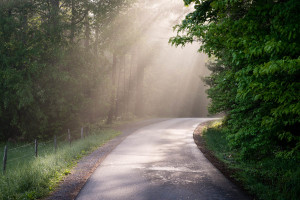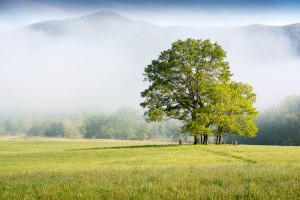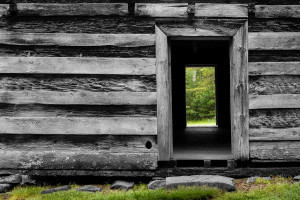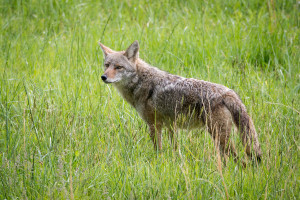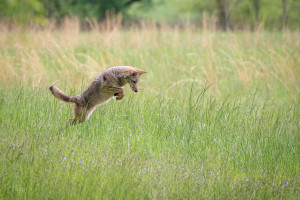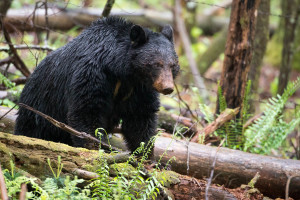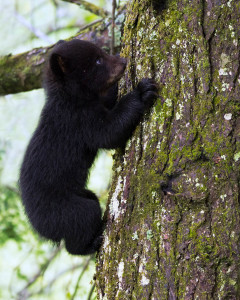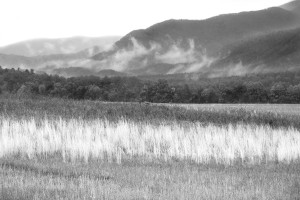For six straight years we’ve made Cades Cove our springtime destination. This year was no exception. It’s the jewel of the Great Smoky Mountains National Park and each spring it shows you why. The trees and grasses are all dressed in that bright yellowy-green color that appears almost artificial. The animals both local and migratory are treated to a bounty of food. Everything seems new and reborn.
There’s a quiet enchantment about the Cove, especially in the early morning light. Clouds hang low making the sun struggle to break through. There’s a sense of peace and wonder as you round each corner of the loop road and behold the magnificent glories of nature.
The sun rises higher while clouds very slowly loosen their grip on the mountains and reveal ridges and summits.
Old houses and structures are sprinkled around the park. Each one invites you to step back in time and experience for a moment what the early days were like.
All of these things draw me back to Cades Cove but, more than anything else it’s the animals that I love.
One of the first critters I saw was a lone coyote. He, like most of the animals we saw this year, was in fine form. Well nourished and sporting a beautiful coat.
I walked along the road, observed him from a distance and could immediately tell he was in hunting mode. He seemed to be tracking a vole or some other small rodent that was under ground. I thought to myself that maybe, just maybe he would jump into the air and do the “pounce” that so many wild animals do. I got my camera adjusted just in case.
To my delight he did it!
My knowledge of animal behavior and body language paid off. I captured the whole sequence as he sprang into the air and landed forcefully on his front paws. Momentarily, he was hidden in the tall grass. He then stood back up and wandered away leaving one less rodent in the field.
This year we had a few overcast days that brought showers. Not all-day rain but, enough to get everything good and wet.
Big old bears can appear particularly menacing when they’re wet and muddy.They can be tough to photograph, too.
Bears are rarely seen in bright light and their fur doesn’t present much contrast to focus on. Early mornings and dusk are prime bear spotting times.
Springtime is great for bear watching because the newborn cubs are getting their first view of the world outside the den.
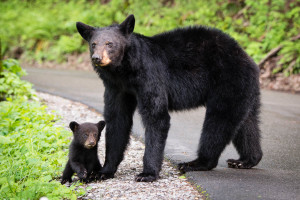 This little guy has a lot to learn. Good thing he’s got a strong and patient mother ready to ensure his survival.
This little guy has a lot to learn. Good thing he’s got a strong and patient mother ready to ensure his survival.
Bears don’t speak English but, their body language can make their intentions pretty obvious.
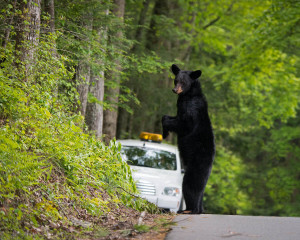 This is bear talk for “back off and let me and my cubs cross the road!”
This is bear talk for “back off and let me and my cubs cross the road!”
The rangers in the park usually do a decent job minimizing problems between humans and animals. But, it’s a struggle keeping the cars moving when a bear is spotted. Although there are numerous pull-offs around the loop road, many people act like idiots by stopping their cars in the middle of the road when they see a critter. They bolt from their cars with camera phones at the ready. Gotta get that shot for their Facebook page.
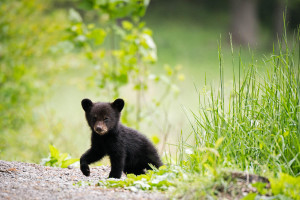 Nobody can resist making a picture of an adorable little bear cub. It’s better if you have long enough lenses to keep a safe distance so neither the bears nor the humans feel threatened.
Nobody can resist making a picture of an adorable little bear cub. It’s better if you have long enough lenses to keep a safe distance so neither the bears nor the humans feel threatened.
One early morning we were blessed to see a sight that we’d never seen before. We were slowly making our way around the loop when we happened upon a large possibly male bear in the woods to our right. My sister-in-law spotted it. I eased the car off the road to the left and we emerged with our cameras. The bear stopped eating and stared at us uneasily. After a few moments of this behavior we sensed something was wrong. We got back into the car and waited until the bear crossed the road.
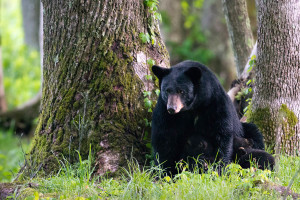 Turns out the bear had two cubs hidden in a tree and we had parked between she and her cubs. “He” was really a “she”. She finally positioned herself at the base of the large tree. After a while the two cubs descended the tree and began to dine on yummy mother’s milk. We were in awe watching her feed her young.
Turns out the bear had two cubs hidden in a tree and we had parked between she and her cubs. “He” was really a “she”. She finally positioned herself at the base of the large tree. After a while the two cubs descended the tree and began to dine on yummy mother’s milk. We were in awe watching her feed her young.
From a very early age, bear cubs are taught to climb trees for safety while their mother searches for food. They are amazing climbers and can scale a tree faster than most people can run on level ground. Often they will find a comfy nook near the top of a tree at the base of a limb and just nod off.
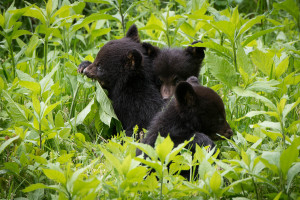 When there’s no sense of danger bear cubs love to stay on the ground near mom and play fight and bite with their siblings. Each cub has their own personality. Some are bold while others are shy. They’re fascinating to watch.
When there’s no sense of danger bear cubs love to stay on the ground near mom and play fight and bite with their siblings. Each cub has their own personality. Some are bold while others are shy. They’re fascinating to watch.
Bear cubs will stay with their mother for a couple of years or more. At some point the mother will basically kick them out of the house and tell them to go get a job. From that point forward they’re on their own. There’s an adjustment period as the young adult bears try to make their own way.
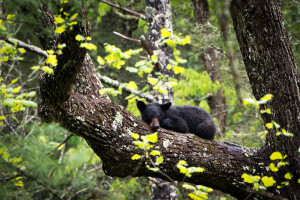 We followed one such young bear for several days during our visit to Cades Cove. Sometimes he would rest on a high limb and exhibit a sense of insecurity as if he was still a cub.
We followed one such young bear for several days during our visit to Cades Cove. Sometimes he would rest on a high limb and exhibit a sense of insecurity as if he was still a cub.
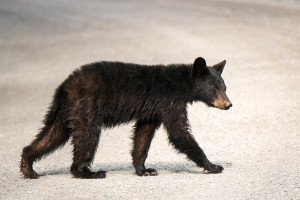 And other times he showed self assurance as he prowled his domain looking for food and adventure.
And other times he showed self assurance as he prowled his domain looking for food and adventure.
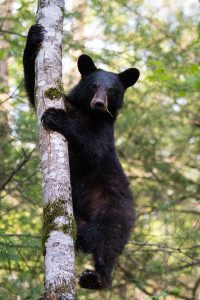 By the end of the week, we were pretty sure this young bear had all of the tools and knowledge to make it in the world. He was looking more like an adult and less like a cub every day.
By the end of the week, we were pretty sure this young bear had all of the tools and knowledge to make it in the world. He was looking more like an adult and less like a cub every day.
While I love watching bears in the park I also have to take a break from that sometimes to look for birds. The spring migration is in full swing so there are lots to choose from.
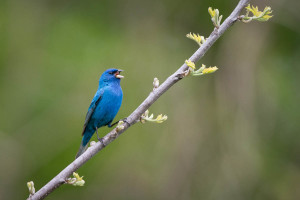 Indigo Buntings are one of my favorites. They winter in Central America and spend summers in the US.
Indigo Buntings are one of my favorites. They winter in Central America and spend summers in the US.
Their song is unmistakable and can be heard throughout the park. These small sparrow sized birds are about five inches in length.
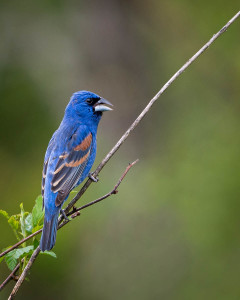 Similar in color but about an inch larger are the Blue Grosbeaks. Their blue is somewhat deeper and more akin to royal blue. I was thrilled this year to finally get a decent image of a Blue Grosbeak. They are definitely harder to find than Indigo Buntings.
Similar in color but about an inch larger are the Blue Grosbeaks. Their blue is somewhat deeper and more akin to royal blue. I was thrilled this year to finally get a decent image of a Blue Grosbeak. They are definitely harder to find than Indigo Buntings.
When you spot those two brown wingbars and the large silver beak you can be confident it’s a Blue Grosbeak and not an Indigo Bunting.
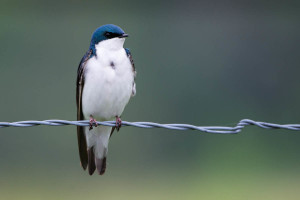 Another bird we spotted that was migrating through is the Tree Swallow. Staying with the blue theme, this fellow has a stunning blue cap and shoulders and bright white breast. Their blue has more green in it but, they are iridescent and can change hue depending on the angle of the light.
Another bird we spotted that was migrating through is the Tree Swallow. Staying with the blue theme, this fellow has a stunning blue cap and shoulders and bright white breast. Their blue has more green in it but, they are iridescent and can change hue depending on the angle of the light.
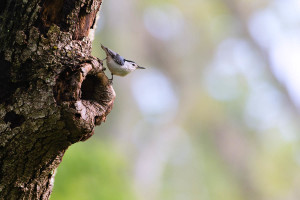 Earlier, while we were watching the mamma bear feed her two cubs, I spotted a small bird up in another tree. It’s a White-breasted Nuthatch. Couldn’t resist swinging my 500mm lens away from the bear for a moment to capture this little guy. Usually you see them hanging upside down. I frequently see them on my backyard feeder.
Earlier, while we were watching the mamma bear feed her two cubs, I spotted a small bird up in another tree. It’s a White-breasted Nuthatch. Couldn’t resist swinging my 500mm lens away from the bear for a moment to capture this little guy. Usually you see them hanging upside down. I frequently see them on my backyard feeder.
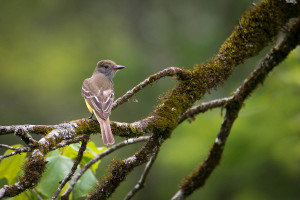 A common but seldom seen bird is this Great Crested Flycatcher. This is my very first photograph of one of these. I was fortunate to have my 80-400mm lens mounted and shot it from the car window immediately after we spotted it.
A common but seldom seen bird is this Great Crested Flycatcher. This is my very first photograph of one of these. I was fortunate to have my 80-400mm lens mounted and shot it from the car window immediately after we spotted it.
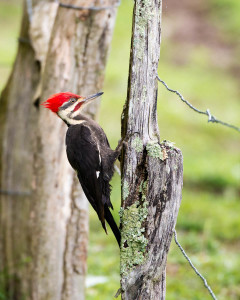 Not a migratory bird but, a favorite nonetheless is the huge Pileated Woodpecker. I never turn down an opportunity to photograph one of these guys. I’m still working toward my “perfect” Pileated Woodpecker image. Maybe someday…
Not a migratory bird but, a favorite nonetheless is the huge Pileated Woodpecker. I never turn down an opportunity to photograph one of these guys. I’m still working toward my “perfect” Pileated Woodpecker image. Maybe someday…
Well, another fantastic spring trip to Cades Cove has come to an end. We had a marvelous week and got to see so many beautiful sights and interesting creatures. It’s sad to be leaving but, time to go.

